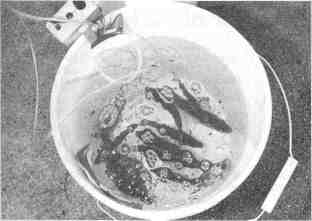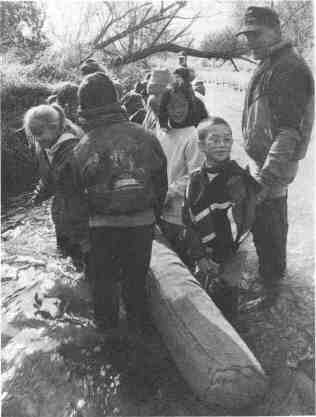

November 1,1997, starred out like a typical autumn Saturday morning for most residents of DuPage County; a slight chill was in the air, and the overcast sky threatened to deprive the area of spirit-lifting sunshine for yet another day. All in all, it appeared to be the perfect time to sleep late or curl up on the couch with a good book or the latest videotape release.
But instead, a group of more than 300 children and adults chose to leave their warm houses to gather around and even wade into the chilly waters of Klein Creek near the DuPage County Forest Preserve District's Klein Creek Farm in Winfield. November 1, you see, was the day set aside for students and teachers from ten DuPage schools to release the 150 smallmouth bass they had nurtured in their classrooms for two months as part of the district's smallmouth bass program.
The fish were released into the waters of Klein Creek, a small tributary of the West Branch of the DuPage River.
More than 1,500 sixth graders participated in the program as surrogate parents, which meant feeding the 10 to 15 smallmouth bass kept in each classroom and regularly cleaning their tanks. Equally important, the children helped preserve the bass' native habitat by restoring a designated section of the Klein Creek stream bank that runs through Timber Ridge Forest Preserve. By late October, the restoration work was complete, and the bassówhich started out 3 to 4 inches long and grew to 4 to 5 inches from a steady diet of minnowsówere large enough to be transported and released.
"The smallmouth program was created to give schoolchildren an understanding of the diversity of life in the county's streams and to demonstrate the necessity of protecting this diversity by controlling the factors that degrade our waterways," said Steve Leonard, a naturalist at the districts Fullersburg Woods Environmental Education Center in Oak Brook and head of its Teacher Resource Center.
Additional naturalists from Fullersburg and staff members from the districts Grounds and Resources Department were recruited to help guide the students' stream-bank restoration work.
The bass program got off the ground last spring, when the district received a $54,000 grant from the Illinois Environmental Protection Agency to restore the plant diversity along Klein Creek and to prevent soil erosion, the number one source of runoff pollution in DuPage streams.
The district enlisted the cooperation of area schools to help remove the harmful reed canary grass that over the years had overgrown the creeks stream bank. The school kids also helped install a variety of soil erosion control structures to hold the exposed soil in place until the streams natural vegetation could be reestablished.
Last fall, the district partnered with the Illinois Department of Natural Resources to expand its stream bank restoration work to include stocking the creek with 150 smallmouth bass supplied by the state. Technical support was provided by two local businesses; Petsmart of Downers Grove, which volunteered tank filters and helped with water-quality issues, and Mount True Value of Warrenville, which agreed to provide minnows at cost.
"The program caught my interest because it gives the kids a living, breathing reason for doing their restoration work. It demonstrates
10 | Illinois Parks and Recreation
THE RETURN OF THE SMALLMOUTH BASS

|

|
the cause and effect of their shoreline restoration efforts," Jim Kleinwachter of Mount True Value explained.
Early last September, Leonard began distributing the bass to ten DuPage schools. Twice a week, he would deliver the live minnows to each of the schools and answer any questions.
"Our students have been ecstatic about working with the fish," said Mary Davis, a sixth-grade science teacher at Monroe Middle School. "Sixth graders are 'doers,' and Steve shows them what to do and explains why. He makes science real for the kids."
The 22 participating teachers incorporated a variety of elements of the smallmouth bass program into their curriculum. In addition to the predator-prey relationship taking place every day in their own fish tanks, the teachers also explored issues like non point-source pollution lution (runoff tainted with motor oil, pesticides, etc.) that affect the bass survival after release.
"The bass program combines ecology with water," Davis said. "It brings the issues to the kids' level and causes them to think twice about the consequences of their actions, such as where the water goes when they wash their cars, or where the salt goes that we spread on icy roads in the winter."
Like many of the other teachers, Davis is looking forward to being involved in the program again this year. Leonard is hoping to expand the program to include more DuPage schools.
Either way, many of the students who waded into the chilly waters on that Saturday morning in November will be out at Klein Creek once more this spring to plant the banks with native prairie plants to help stabilize the shoreline. They'll also be back to look for signs of their beloved smallmouth bass.
TIM HOUSTON
is a public affairs specialist for the Forest Preserve District of DuPage County.
STEVE LEONARD
is a naturalist at DuPage County's Fullersburg Woods Environmental Education Center who also heads its
Teacher Resource Center.
This article originally appeared in the Forest Preserve District of DuPage County's quarterly publication
"The program caught my interest because it gives the kids a living, breathing reason for doing their restoration work."
-Jim Kleinwachter of Mount True Value, a program sponsor
March/April 1998 ¦ 11